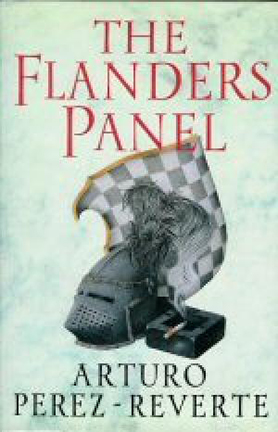Home »

A compelling and exciting way to learn
Book Review
By Derryll White
Perez-Reverte, Arturo (1990). The Flanders Panel.
Born in Cartagena, Spain, this is Arturo Perez-Reverte’s first mystery novel. He brings to the work the subtleties and culture his nation is known for. The story moves effortlessly between the 15th and 20th centuries, creating an illusion of doors and windows into a world gone forever but nevertheless still present.
The author is erudite and draws on a diverse and uncommon range of knowledge. There are many references to early European history and political intrigue. There are fascinating facts and stories about historic artists. Perez-Reverte presents a wealth of insight into the art world, the world of contemporary art restoration, as well as galleries and collectors. It is one of the many things I enjoy about this particular writer, an opportunity to learn beyond my familiar points of reference.
 Within the novel there is a definite connotation of parallel universes, of worlds within worlds and all operating at once. An allusion to three-dimensional chess is definitely worth considering. Here, as in life, the author definitely recognizes that nothing is as it seems, but all has a plan. Perez-Reverte constructs a wonderful sub-character who thinks of nothing but chess and the possibilities contained therein. Minoz sees no reason to win a game. His passion is in the construct and resolution of the problem posed by the game itself.
Within the novel there is a definite connotation of parallel universes, of worlds within worlds and all operating at once. An allusion to three-dimensional chess is definitely worth considering. Here, as in life, the author definitely recognizes that nothing is as it seems, but all has a plan. Perez-Reverte constructs a wonderful sub-character who thinks of nothing but chess and the possibilities contained therein. Minoz sees no reason to win a game. His passion is in the construct and resolution of the problem posed by the game itself.
I also appreciate the smoky sense of lust and passion that Perez-Reverte infuses his work with. Nothing so cheap as sweat and groping, no carnality. Rather, he has his characters move elegantly, eating the finest meals and drinking great wine, promising everything with their eyes and finely-tuned phrases. Totally outside my abilities – I don’t even own a cravat – but nevertheless he makes me wish for a moment that I was capable of such engaging behaviour with such wonderful promised benefits In another life maybe, but in the meantime I will simply appreciate the world he presents.
For me, it is the love of books and the joy of women, the promise of what each of them presents as one looks across the room, the delight in realizing their sensuous reality.
Ultimately, is there truth or is there only a world that we come to terms with? Are women simply the sum of coursing and declining hormones, are men only the sum absurdity of their sex drive? Munoz, the magical chess player in this novel, votes for truth which is always, with enough work, demonstrable. I really enjoyed this book. It made me more involved and at ease with the wonderful world I inhabit.
Perez-Reverte is insightful in the way he approaches art in this novel. He brings it to life in many different ways. With the featured Van Huys work, ‘The Game of Chess,’ he moves back and forth in perspective and thereby takes the reader toward views perhaps not otherwise realized. He brings in concepts of space and time worthy of A.N. Whitehead’s ‘Process and Reality.’ He does similar things with Escher and Brueghel, giving me things to ponder for my next trip to Spain or to a good art collection.
I found this a compelling book, both an exciting read and a delightful opportunity to learn. I would definitely recommend it. It made me more involved and at ease with the wonderful world I inhabit.
********
FATE – Every thing came together in that one definitive scene, where, regardless of how the dice fell, the last dice thrown on the card table of the Earth, beauty and ugliness, love and hatred, good and evil, hard work and profligacy would all meet their end.
ART – Menchu was nearer fifty than forty and was of the firm belief that sex was to be found everywhere, even in the most subtle nuances of a work of art. Perhaps that’s why she was able to look at men with the same calculating, greedy eye she employed when assessing the potential of a painting.
FRIENDS – You don’t choose your friends, they choose you, and you either reject them or accept them without reservations.
LIFE – She’d grown up quite fast and that whole moral process had crystallized in the belief …that life is like an expensive restaurant where, sooner or later, someone always hands you the bill, which is not to say that you should deny the joy and pleasure afforded by the dishes already eaten.
PERSPECTIVE – Furthermore, his head was placed exactly at the intersection of lines known in painting as the golden section, the law of pictorial composition that classical painters from the time of Vitsuvius onwards had used as a guide to the proportions of figures in a painting.
CLASS – He had a breadth and degree of culture Julia had never met elsewhere and was the most perfect embodiment of the saying that amongst the upper classes politeness is merely the most highly refined expression of one’s scorn of others.
BEAUTY – “Life is short and beauty transient, Princess…. And it would be wrong to possess it for ever. The beauty lies in teaching a young sparrow to fly, because implicit in his freedom is your relinquishment of him”
REALITY – There’s nothing more misleading than an obvious fact. That’s a principle from logic which is equally applicable in chess: what seems obvious doesn’t always turn out to be what really happened or what is about to happen.
CHARM – It must be the ironic gleam in his blue eyes, the elegance distilled through generations of fine breeding and the easy assumption of world-weary wisdom, tolerant and infinite, to which he never gave complete expression – he rarely took himself entirely seriously – but which was nonetheless there in every word he uttered.
WOMEN – “Imagine he’s married. Or was… He seems damaged in the way only we women can damage men.”
BIRTHRIGHT – Man was not born to solve the problems of the world, merely to discover where the problem lies.
TRUTH – “Allow me to say… as the musician I still am, that every system is incomplete. That demonstrability is a much weaker concept than truth.
“The truth is like the perfect move in chess; it exists, but you have to look for it. Given enough time, it’s always demonstrable.”
FATE – In the end, all paintings were paintings of the same painting, just as all mirrors gave the reflection of the same reflection and all deaths were the death of the same Death:
‘Tis all a Chequer board of Night and Days
where Destiny with Men for Pieces plays….’
 – Derryll White once wrote books but now chooses to read and write about them. When not reading he writes history for the web at www.basininstitute.org.
– Derryll White once wrote books but now chooses to read and write about them. When not reading he writes history for the web at www.basininstitute.org.







